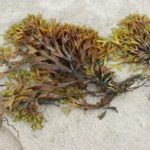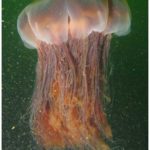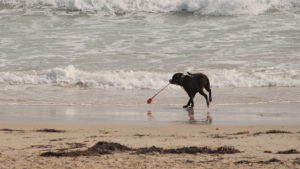Beware hidden hazards on the beach
Summer is here and your dog is tugging at the leash to explore all the new sights and smells that a beach trip has to offer. Take care though; the coastline can harbour hidden dangers for man and beast. Following our previous post on toxic plants, we take a closer look at how to protect your dog and enjoy your holiday together, safely.
Seaweed is not a tasty treat

Seaweed can have many health benefits for your hound – that’s why many of our foods contain seaweed extract. However, a full-sized plant lying on the beach should definitely not be eaten. Having spent hours drying in the hot sun, a large frond is reduced to a finger-sized stem. Once rehydrated in your dog’s stomach, the consequences are potentially lethal. Initial symptoms include vomiting, diarrhoea, loss of appetite and lethargy. Medical attention should be sought immediately.
Keep an eye on the tide
Most dogs can’t resist the temptation to show off their best doggy paddle and the sea is the perfect playground. Do be aware though. The tide and the waves can be powerful and unpredictable plus the water can conceal sharp rocks and obstacles. If your pet enjoys exercising in the sea, ensure you have checked what is on the sea bed below.
Jellyfish may intrigue but could deliver a nasty shock

An unusually high number of jellyfish along Britain’s southern coastlines have been reported recently. Although often very large, these are usually harmless barrel jellyfish. It is possible though, to encounter more sinister and potentially harmful species. For example, the Compass jellyfish and the Lions Mane jellyfish can deliver severe stings long after being washed up.
Once stranded, it can be difficult to identify a species of jellyfish. The best advice is never to touch one or let your dog near one and move to a clear area of the beach.
Unidentified washed up substances
In February this year, palm oil made headline news as large quantities of the solid, waxy substance washed up on the East Sussex coastline. Dog owners were warned not to allow their pets to eat the white lumps which, despite smelling rotten, they seemed to find attractive. The main problems for dogs were vomiting and diarrhoea and there was no specific treatment for this type of poisoning. In all cases of discovering unidentified substances, dog owners should always avoid them and report them to the local port authority.
Don’t be put off a visit to the beach
We are sure you will agree that nothing beats a long stroll in the fresh sea air and your dog is sure to enjoy his time exploring this fantastic environment. Common sense, a sharp eye and a ball or stick should be all you need to have an exciting and invigorating break on one of our many beautiful beaches. The golden rule is simply ‘if in doubt, avoid it’.
Wishing you a fantastic holiday!






